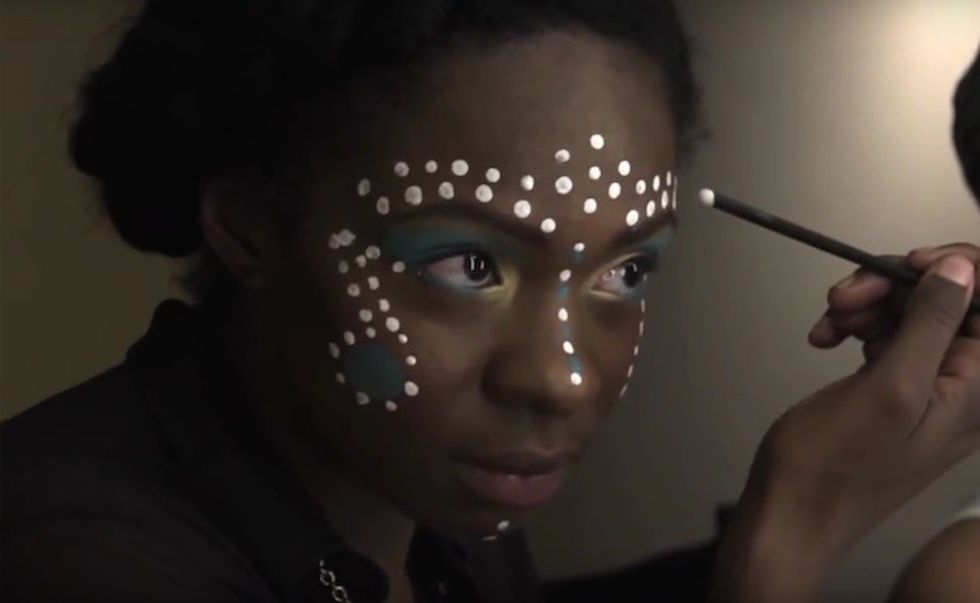To Dot Or Not To Dot?: My Thoughts On The Whole 'Can African-Americans Appropriate African Culture?' Debate
What's a Black woman to do when she wants to wear regal face paint art but is worried about appropriating another Black person's culture?

Performer Shakira Marshall preps to perform as one of Fela Kuti’s queens at Sundance 2014
Between you and me, I’ve really been wanting to speckle my face with white dots. To imitate the stunning face art I’ve encountered at Brooklyn’s annual Afropunk festival and other parties populated by New York City’s most avant-garde Black hipsters. To look majestic, fearless and unapologetically Black. I really, really want to.
But, what’s stopped me from doing so has been my inability to refer to the art form as anything other than “white dots.” Prefacing the vague phrase with oversimplified words like “tribal” or “African” is out of the question, so, again, I’m left with “white dots.” Which only amplifies the fact that I know practically nothing about the origins of this cultural practice, at least not enough to determine whether my wearing it would cause offense to people from said culture.
To be clear, I have rocked headscarfs made with fabric from Zambia and Masaai jewelry gifted by my longtime Kenyan partner. On the other hand, I could argue that the latter are products intended for adornment, while the former stems from some deep-rooted tradition unbeknownst to me. So, what’s been stopping me from donning the white dots?
Every time I asked myself that question, images of white Coachella-goers wearing Native American headdresses came to mind, as would another question: Would I, a first-generation Black American woman, be guilty of appropriating another Black person's culture?
Apparently, I was not the only one nagged by this issue. My concerns were validated when a young Nigerian journalist decided to write an article - “Black America, please stop appropriating African clothing and tribal marks.” The plethora of face paint captured by street style photographers at Afropunk seemed to be the last straw for Zipporah Gene.
“On the scale of global issues, I admit this is petty, but it is something that should still be addressed,” she wrote. “It won’t be long before Zara starts selling tribal face paints. They already sold dashiki-styled prints, so why not? It’s time we all took a break and thought about what it is we’re wearing…It is should not be a fashion statement to create shock or awe. Black people or otherwise.”
@msbee_x -_- all I'm tryna find out is when did our culture become 'fancy dress'. Not cool - https://t.co/lOHJpU03dN pic.twitter.com/KItuuhsSma
— Zipporah Gene (@shedoesliving) September 1, 2015
Gene’s charged words have since ignited crucial discussions around identity politics in relation to Black Americans and Europeans and Africans, as well as a host of response pieces penned by Nadra Nittle, Demetria Irwin, Jouelzy, Hannah Onifade and more. In each of these pieces, the writer calls out Gene for her disregard of complicated nuances inherent to questions of authentic African identity and African-Americans.
“There’s no comparison between American blacks in African garb and white Australians in Aboriginal makeup, as Zipporah Gene suggests in her appropriation piece,” wrote Nittle. “The white Australian has neither the emotional nor the ancestral connection to Aboriginal culture that American blacks have to Africa. The white Australian doesn’t fear that he will be further marginalized in the Western world for styling himself in a manner that highlights, instead of downplays, his difference. But it appears that Gene may be too unfamiliar with African American history to recognize this.”
Irwin went so far as to admit that Gene has a point about African-Americans being capable of cultural appropriation, but insisted that “this particular argument ain’t it.” “White supremacy has had hundreds of years in the United States to do an insidiously excellent job of separating black people in this country from their African roots in every way,” she wrote. “To shame or fault African-Americans for seeking to reclaim and exalt that very same culture is missing the mark.”
As for me and my white dot dilemma? I’m team gray for this matter. In other words, both the YES and NO camps of this cultural appropriation controversy have valid grounds (disclaimer: I’m not casting all of the abovementioned mentioned writers as the NO camp.)
Are African-Americans appropriating certain African cultures by wearing white dots? I’d say no. To appropriate means to take something for one’s own use without the permission of the owner; and, in this case, African-Americans descended from Africa, so do not need their own permission. Whether Gene or anyone else likes it or not, African-Americans are irrevocably bound to the continent of Africa.
However, I will insist that these cultural markers—white dots included— have immense historical value and are more than worth time spent researching their origins and stories, both past and present. If Gene is as genuinely offended as she claims to be (and she has not led me to believe otherwise,) then African-Americans—myself, a Caribbean-American included—should certainly consider her and others’ grievances on the matter and continue teasing out these worthwhile discussions.
So, until I take the time to thoroughly research the histories and meanings of this regal facial art, I’ll be over here barefaced and spotless.


